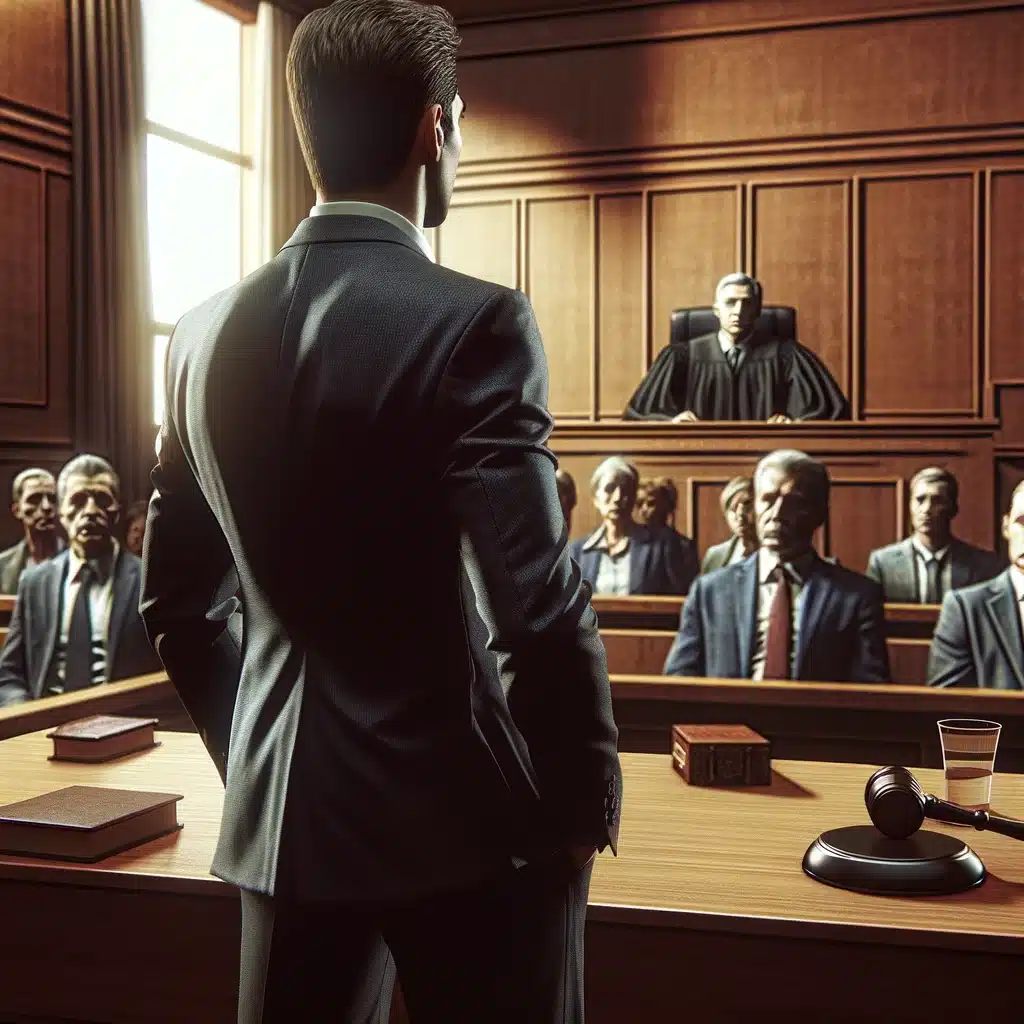A Surprising Journey into the World of Courtroom Defense
How to defend yourself in court? We’ve got you covered! In this captivating article, we’ll take you on a rollercoaster ride through the ins and outs of defending yourself in court. Get ready to discover the secrets, strategies, and real-life tales that will empower you to face the courtroom with confidence.

Picture this: You find yourself in a courtroom, heart pounding, palms sweaty, and the weight of your case resting squarely on your shoulders. It’s a daunting experience, one that can leave even the most composed individuals feeling like a deer caught in headlights. But fear not! Today, we’re embarking on a thrilling adventure that will equip you with the knowledge and skills to navigate the maze of legal proceedings and defend yourself like a seasoned pro.
Why should I keep reading?
Well, dear reader, let me give you three compelling reasons. First, we’ll unravel the mysteries of your legal rights and obligations in child custody cases, shedding light on decision-making authority, visitation rights, child support, and more. You’ll gain a deep understanding of the playing field, arming yourself with the knowledge you need to protect what matters most – your family.
Secondly, we’ll introduce you to the powerful world of child custody mediation. Prepare to discover an alternative path, one that encourages collaboration, compromise, and finding common ground. Through captivating real-life stories, you’ll witness how mediation can transform conflicts into constructive conversations, saving you from the emotional turmoil and expense of a courtroom battle.
But wait, there’s more! We’ll delve into the factors that judges consider when determining child custody arrangements. We’ll explore the nuances of parental fitness, the child’s well-being, and the crucial importance of providing a loving and stable environment. Armed with this insight, you’ll be ready to showcase your strengths and demonstrate why your child’s future is in the best hands possible – yours!
So, buckle up and get ready for an exhilarating journey through the captivating realm of defending yourself in court. From the importance of legal representation to effective strategies for gathering evidence, we’ve got all the tools you need to champion your case. It’s time to take control, advocate for your rights, and ensure the well-being of your child.
Are you ready? Let’s dive in and unlock the secrets of how to defend yourself in court!
Legal Rights and Obligations in Child Custody Cases
In a child custody case, parents have specific rights and obligations that must be considered. These include decision-making authority, visitation rights, child support, and determining the child’s primary residence. Each parent has the right to make decisions regarding the child’s upbringing, including education, healthcare, and religious upbringing. It is important to understand these rights and obligations to effectively defend yourself in court.
Child Custody Mediation
Mediation can be a valuable option for resolving child custody disputes outside of court. It involves a neutral third party who assists the parents in reaching a mutually agreeable solution. Mediation allows parents to actively participate in creating a parenting plan that addresses the best interests of the child. It promotes open communication, cooperation, and compromise, reducing the need for lengthy and adversarial court battles.
Factors Considered in Determining Child Custody
Family court judges consider various factors when determining child custody arrangements. The primary consideration is the best interests of the child. This includes evaluating parental fitness, the child’s emotional and physical well-being, opportunities for relationship-building with both parents, and the living conditions provided by each parent. Judges carefully assess these factors to ensure the child’s safety, stability, and overall welfare.
Importance of Legal Representation in Child Custody Cases
Hiring a family law attorney is crucial when navigating the complexities of a child custody case. An experienced attorney can provide valuable guidance and ensure that your rights are protected throughout the legal process. They possess the knowledge and expertise to present your case effectively, negotiate on your behalf, and advocate for your desired outcome. Having legal representation significantly increases your chances of achieving a favorable child custody arrangement.
Responding to Child Custody Lawsuits
When faced with a child custody lawsuit, it is essential to respond appropriately. This involves filing an answer within the specified timeframe, typically within 20 days of being served with the original petition. Understanding timelines and deadlines is crucial to avoid potential consequences. Additionally, there may be circumstances where filing a counter-petition is necessary to assert your own requests and address specific concerns regarding the custody arrangement.

Gathering Evidence and Building a Case
Building a strong case requires gathering relevant evidence and presenting compelling arguments. Evidence may include documentation of a parent’s involvement in the child’s life, their ability to meet the child’s needs, and any relevant history or incidents that impact their parenting skills. It is essential to emphasize both legal principles and the specific facts and circumstances of your case to support your position effectively.
Factors Considered |
Explanation |
|
Child’s Best Interests |
Family court judges prioritize the well-being of the child above all else. They consider factors such as the child’s emotional and physical needs, their relationship with each parent, and their overall safety and stability. The court aims to make decisions that promote the child’s happiness and healthy development. |
|
Parental Fitness |
The court assesses the fitness of each parent by evaluating their ability to meet the child’s needs. Factors such as the parent’s mental and physical health, parenting skills, and willingness to support the child’s emotional and educational needs are taken into account. The court seeks to ensure that the child is placed in a nurturing and supportive environment. |
|
Emotional and Physical Well-being |
The child’s emotional and physical well-being is of utmost importance. The court examines the living conditions provided by each parent, including the availability of a safe and stable home, access to healthcare, and a nurturing environment that promotes the child’s overall well-being. |
|
Relationship-building Opportunities |
Judges consider the willingness and ability of each parent to foster a healthy and loving relationship between the child and the other parent. They look for evidence of cooperation, communication, and support for the child’s relationship with both parents. The court aims to maintain and enhance the parent-child bond whenever possible. |
|
Living Conditions |
The court evaluates the living conditions offered by each parent, taking into account factors such as the cleanliness and safety of the home, the availability of appropriate living space, and access to necessary amenities. The child’s comfort and safety are paramount in determining the suitability of each parent’s living environment. |
Parenting Skills and History
A parent’s past behavior, parenting skills, and ability to meet their child’s needs play a significant role in child custody decisions. Demonstrating a strong sense of responsibility and commitment to the child’s well-being is crucial. Providing evidence of positive parenting practices, involvement in the child’s education and extracurricular activities, and a safe and nurturing environment can greatly influence the court’s decision.
Alternative Dispute Resolution Methods
While litigation is often the default route for child custody disputes, alternative dispute resolution methods can offer viable alternatives. Collaborative law and arbitration provide opportunities for parents to resolve conflicts outside of court. These methods prioritize cooperation, communication, and the best interests of the child. Exploring these options with the guidance of an attorney can lead to more efficient and amicable resolutions.
The Impact of Drug or Alcohol Abuse on Child Custody Cases
Allegations of drug or alcohol abuse can significantly impact child custody cases. Courts prioritize the safety and well-being of the child, and substance abuse issues may raise concerns about a parent’s ability to provide a stable and secure environment. Depending on the circumstances, the court may order drug or alcohol testing or require the completion of rehabilitation programs. It is crucial to address these allegations effectively and demonstrate a commitment to overcoming any substance abuse issues.

Long-Term Consequences of Child Custody Decisions
Child custody decisions have long-term consequences that can significantly impact the parent-child relationship. It is essential to make informed decisions that prioritize the child’s well-being and maintain a positive and nurturing environment. Ongoing communication, cooperation, and flexibility between parents are crucial for the successful implementation of a custody arrangement. Parents must prioritize the child’s needs and adapt to changing circumstances to ensure a healthy and stable upbringing.
By understanding the legal rights and obligations in child custody cases, exploring alternative dispute resolution methods, and building a strong case with the help of legal representation, parents can effectively defend themselves in court. Demonstrating parenting skills, addressing substance abuse issues, and making informed decisions that prioritize the child’s well-being contribute to a favorable custody arrangement and long-term positive outcomes.
The Final Verdict: Empowered and Ready to Defend!
So, can you defend yourself in court? Absolutely! Armed with newfound knowledge, strategies, and a dash of courage, you’re now equipped to face any legal challenge head-on. In this exhilarating conclusion, we’ll wrap up our journey and leave you feeling empowered and ready to take on the world.
Imagine this: you walk into the courtroom, a sense of confidence radiating from every pore. The judge’s gavel echoes through the air, and you calmly present your case, armed with compelling arguments and a steadfast determination. The room hangs on your every word, and you feel the power of your newfound knowledge propelling you forward. It’s a moment of triumph, a testament to your resilience and unwavering commitment to your child’s well-being.
But let’s rewind for a moment and reflect on the incredible insights we’ve gained throughout this adventure. We’ve discovered the intricacies of legal rights and obligations, exploring the complex landscape of child custody cases. We’ve witnessed the transformative power of mediation, where bitter disputes can be transformed into cooperative conversations. And we’ve dived into the minds of judges, unraveling the factors that shape their decisions and learning how to present ourselves in the best possible light.
Throughout this journey, we’ve encountered stories of triumph, tales of heartache, and everything in between. We’ve learned from the experiences of real people who have fought tooth and nail to defend what matters most – their children. These stories have reminded us that behind every legal battle lies a human story, filled with emotions, dreams, and a desire for justice.
Empowered in Court: Your Journey
So, as we reach the end of this captivating expedition, what can you take away from it? The answer is simple: you have the power to defend yourself in court. With knowledge as your ally and determination as your guide, you can navigate the intricate maze of legal proceedings with grace and strength. Whether you choose the traditional path of legal representation or embrace alternative dispute resolution methods, the choice is yours. You are the hero of your own story.
Remember, dear reader, that the impact of your actions extends far beyond the courtroom walls. Every decision you make today will shape the future of your parent-child relationship. By prioritizing your child’s well-being, demonstrating your commitment, and embracing the lessons learned on this thrilling journey, you can forge a bond that withstands the test of time.
So, as you step out of this virtual courtroom, head held high and a newfound fire in your heart, remember this: you are not alone. Countless others have walked this path before you, facing their fears and emerging victorious. And now, it’s your turn. You have the tools, the knowledge, and the unwavering determination to defend yourself in court and secure the best possible future for your child.
Go forth, brave defender, and let your story be one of resilience, strength, and unwavering love. The courtroom awaits, and you are more than ready.
This concludes our incredible journey into the realm of defending yourself in court. Thank you for joining us, and remember, you have the power to make a difference.
Other Related Articles:
- Defending False Divorce Allegations
- How To Protect Your Rights and Yourself
- The Pitfalls of Do it Yourself Divorce Kits
- Courtroom Conduct: Things Self Represented Litigants Should Know
- Potential Hurdles When Self Representing in Family Law
- Representing yourself in a Texas divorce: What to do and why you may not want to
- How to stand up for yourself during a Texas CPS case
- Representing yourself in your divorce? Be sure to consider these popular divorce myths
- The Dirty Divorce Trick of The Do it Yourself Divorce
- Facing a child custody evaluation? Here are tips to conducting yourself with the evaluator
Frequently Asked Questions
Can I defend myself in court in Texas?
What are grounds for self-defense in Texas?
How do you defend yourself in a case?
Can a man defend himself against a woman in Texas?
Bryan Fagan, a native of Atascocita, Texas, is a dedicated family law attorney inspired by John Grisham’s “The Pelican Brief.” He is the first lawyer in his family, which includes two adopted brothers. Bryan’s commitment to family is personal and professional; he cared for his grandmother with Alzheimer’s while completing his degree and attended the South Texas College of Law at night.
Married with three children, Bryan’s personal experiences enrich his understanding of family dynamics, which is central to his legal practice. He specializes in family law, offering innovative and efficient legal services. A certified member of the College of the State Bar of Texas, Bryan is part of an elite group of legal professionals committed to ongoing education and high-level expertise.
His legal practice covers divorce, custody disputes, property disputes, adoption, paternity, and mediation. Bryan is also experienced in drafting marital property agreements. He leads a team dedicated to complex family law cases and protecting families from false CPS allegations.
Based in Houston, Bryan is active in the Houston Family Law Sector of the Houston Bar Association and various family law groups in Texas. His deep understanding of family values and his professional dedication make him a compassionate advocate for families navigating Texas family law.




